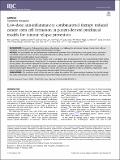| dc.contributor.author | Khoo, Bee Luan | |
| dc.contributor.author | Grenci, Gianluca | |
| dc.contributor.author | Lim, Joey Sze Yun | |
| dc.contributor.author | Lim, Yan Ping | |
| dc.contributor.author | Fong, July | |
| dc.contributor.author | Yeap, Wei Hseun | |
| dc.contributor.author | Lim, Su Bin | |
| dc.contributor.author | Chua, Song Lin | |
| dc.contributor.author | Wong, Siew Cheng | |
| dc.contributor.author | Yap, Yoon-Sim | |
| dc.contributor.author | Lee, Soo Chin | |
| dc.contributor.author | Lim, Chwee-Teck | |
| dc.contributor.author | Han, Jongyoon | |
| dc.date.accessioned | 2020-06-05T19:56:58Z | |
| dc.date.available | 2020-06-05T19:56:58Z | |
| dc.date.issued | 2019-02 | |
| dc.date.submitted | 2018-09 | |
| dc.identifier.issn | 0007-0920 | |
| dc.identifier.issn | 1532-1827 | |
| dc.identifier.uri | https://hdl.handle.net/1721.1/125700 | |
| dc.description.abstract | Background: Emergence of drug-resistant cancer phenotypes is a challenge for anti-cancer therapy. Cancer stem cells are identified as one of the ways by which chemoresistance develops. Method: We investigated the anti-inflammatory combinatorial treatment (DA) of doxorubicin and aspirin using a preclinical microfluidic model on cancer cell lines and patient-derived circulating tumour cell clusters. The model had been previously demonstrated to predict patient overall prognosis. Results: We demonstrated that low-dose aspirin with a sub-optimal dose of doxorubicin for 72 h could generate higher killing efficacy and enhanced apoptosis. Seven days of DA treatment significantly reduced the proportion of cancer stem cells and colony-forming ability. DA treatment delayed the inhibition of interleukin-6 secretion, which is mediated by both COX-dependent and independent pathways. The response of patients varied due to clinical heterogeneity, with 62.5% and 64.7% of samples demonstrating higher killing efficacy or reduction in cancer stem cell (CSC) proportions after DA treatment, respectively. These results highlight the importance of using patient-derived models for drug discovery. Conclusions: This preclinical proof of concept seeks to reduce the onset of CSCs generated post treatment by stressful stimuli. Our study will promote a better understanding of anti-inflammatory treatments for cancer and reduce the risk of relapse in patients. | en_US |
| dc.description.sponsorship | Singapore. National Medical Research Council (Grant NMRC) | en_US |
| dc.language.iso | en | |
| dc.relation.isversionof | https://dx.doi.org/10.1038/s41416-018-0301-9 | en_US |
| dc.rights | Creative Commons Attribution 4.0 International license | en_US |
| dc.rights.uri | https://creativecommons.org/licenses/by/4.0/ | en_US |
| dc.source | Nature | en_US |
| dc.title | Low-dose anti-inflammatory combinatorial therapy reduced cancer stem cell formation in patient-derived preclinical models for tumour relapse prevention | en_US |
| dc.type | Article | en_US |
| dc.identifier.citation | Khoo, Bee Luan, Gianluca Grenci, Joey Sze Yun Lim et al. "Low-dose anti-inflammatory combinatorial therapy reduced cancer stem cell formation in patient-derived preclinical models for tumour relapse prevention." British Journal of Cancer (February 2019) 120:407-423 © 2019, The Author(s). | en_US |
| dc.contributor.department | Singapore-MIT Alliance in Research and Technology (SMART) | en_US |
| dc.contributor.department | Massachusetts Institute of Technology. Department of Electrical Engineering and Computer Science | en_US |
| dc.contributor.department | Massachusetts Institute of Technology. Department of Biological Engineering | en_US |
| dc.relation.journal | British Journal of Cancer | en_US |
| dc.eprint.version | Final published version | en_US |
| dc.type.uri | http://purl.org/eprint/type/JournalArticle | en_US |
| eprint.status | http://purl.org/eprint/status/PeerReviewed | en_US |
| dc.date.updated | 2019-06-05T16:10:43Z | |
| dspace.orderedauthors | Khoo, Bee Luan; Grenci, Gianluca; Lim, Joey Sze Yun; Lim, Yan Ping; Fong, July; Yeap, Wei Hseun; Lim, Su Bin; Chua, Song Lin; Wong, Siew Cheng; Yap, Yoon-Sim; Lee, Soo Chin; Lim, Chwee Teck; Han, Jongyoon | en_US |
| dspace.date.submission | 2019-06-05T16:10:44Z | |
| mit.journal.volume | 120 | en_US |
| mit.metadata.status | Complete | |
